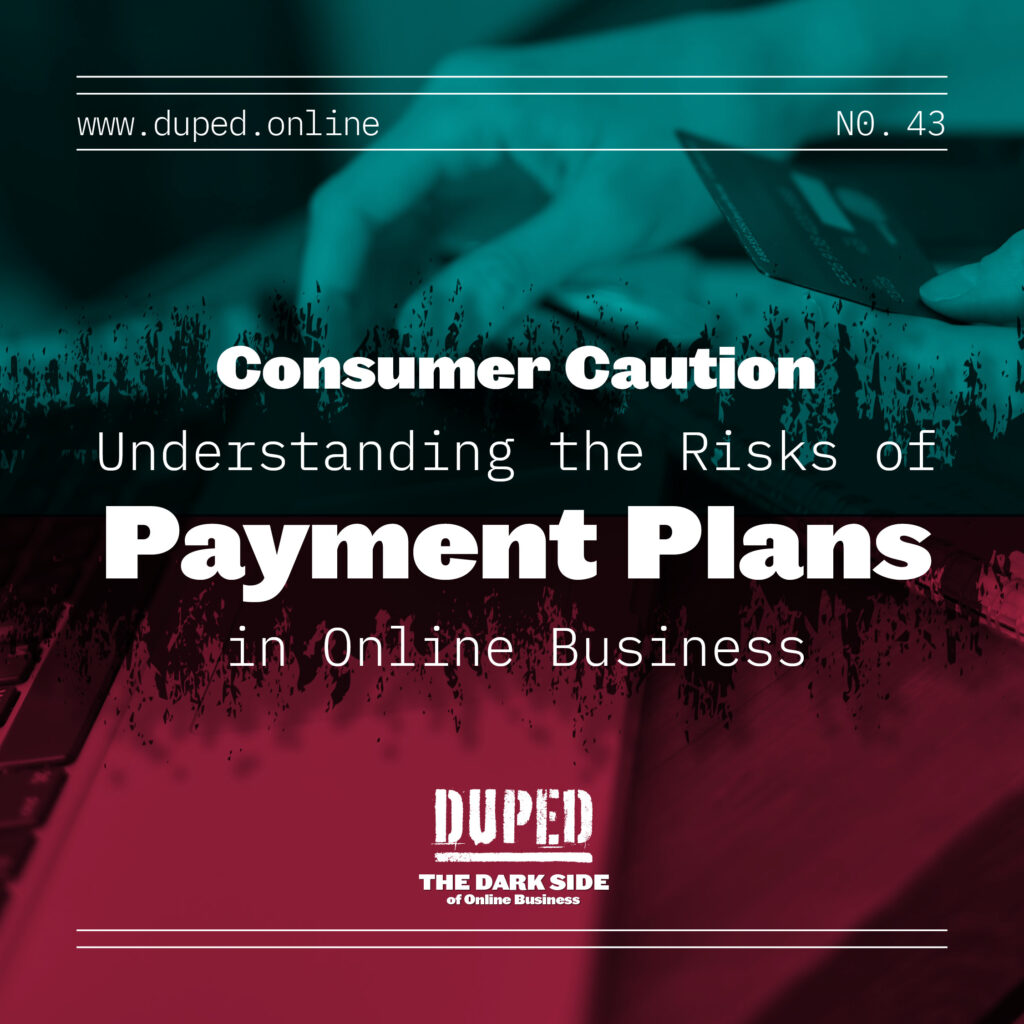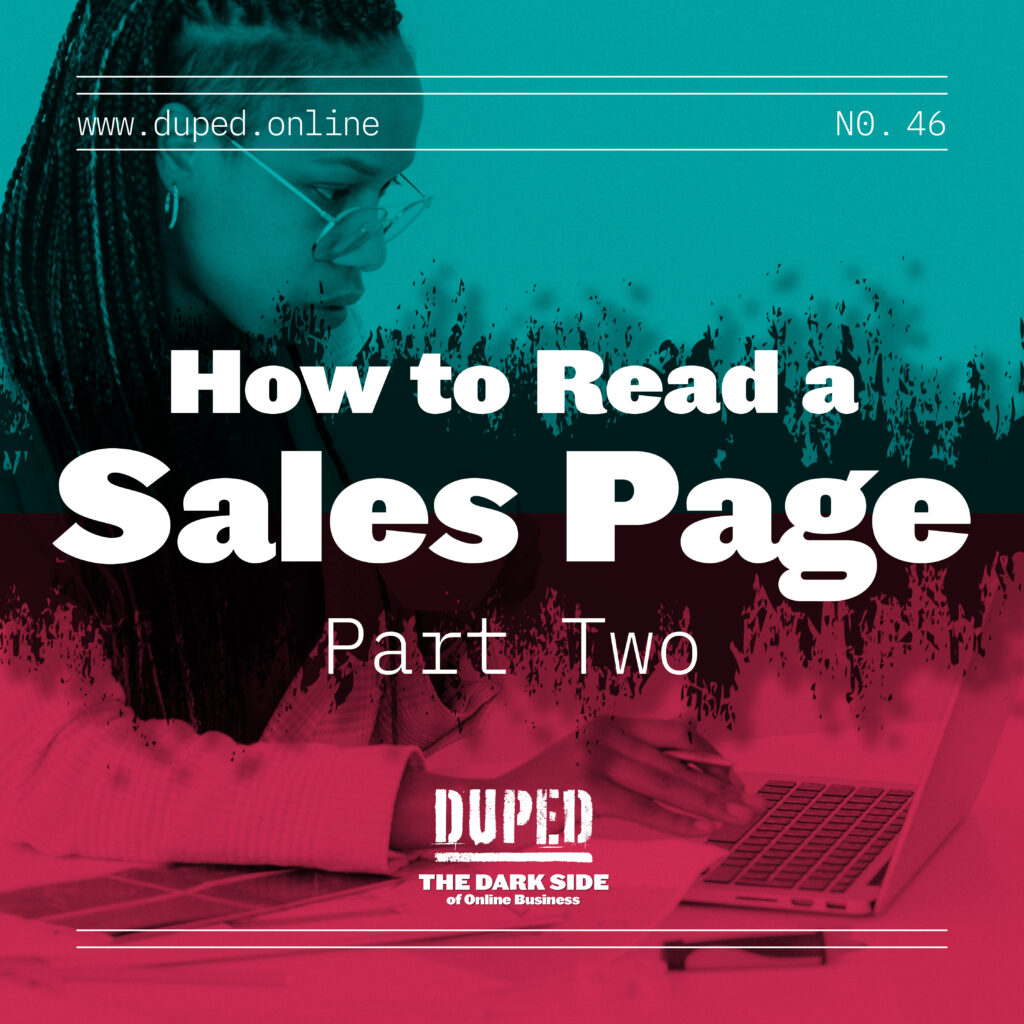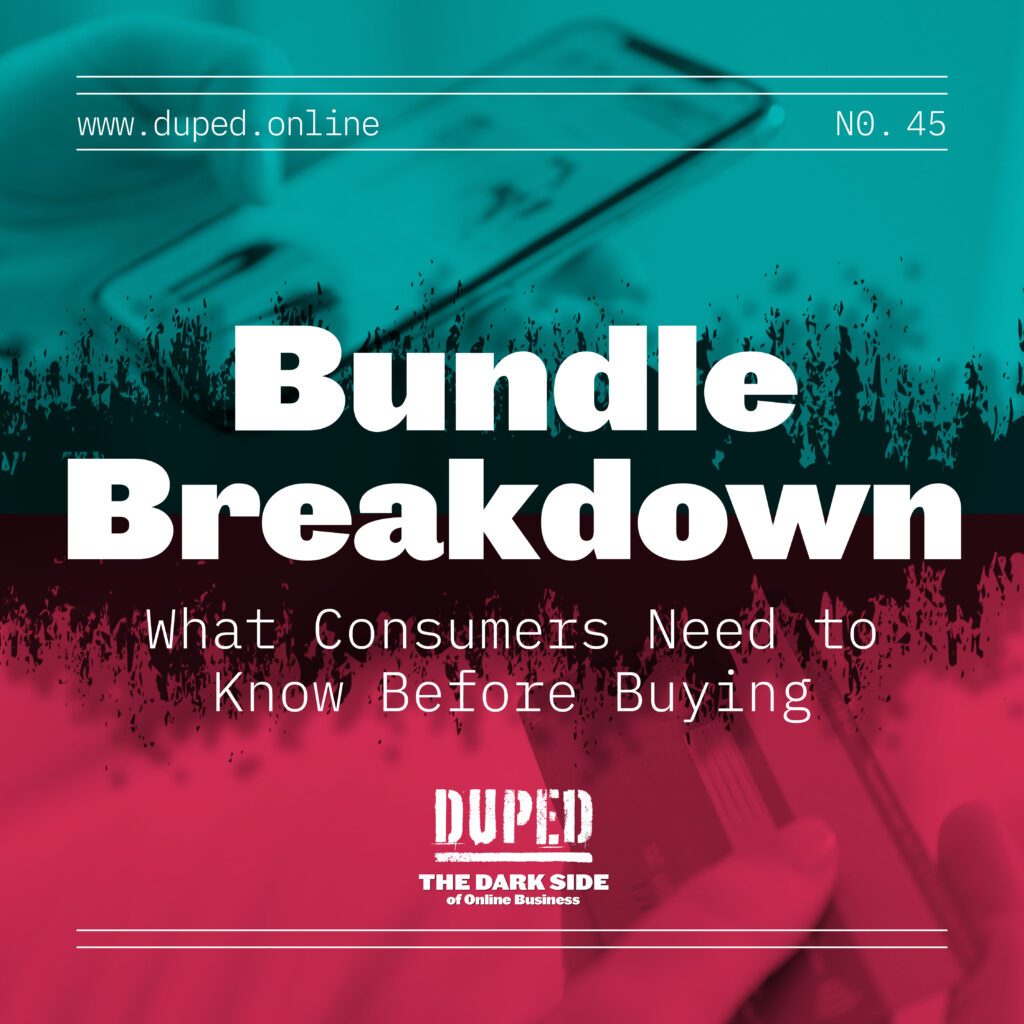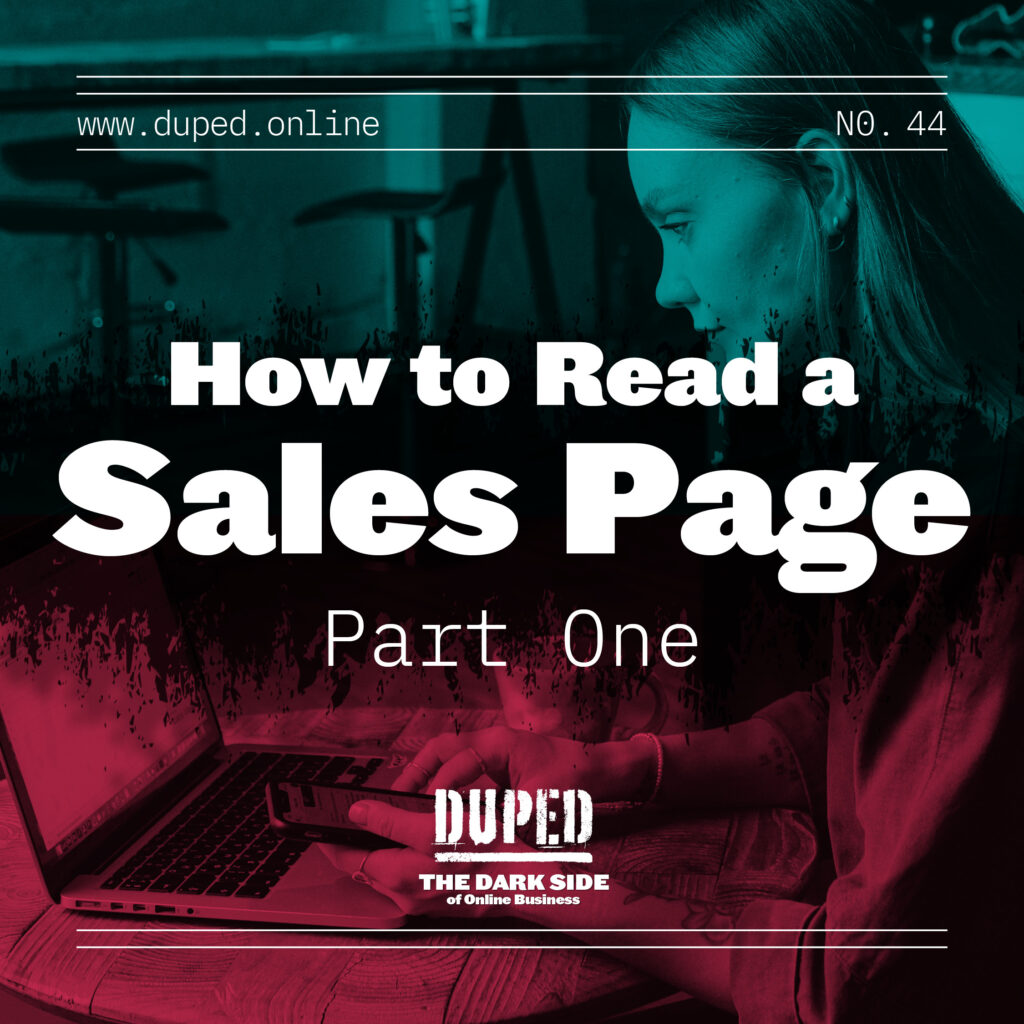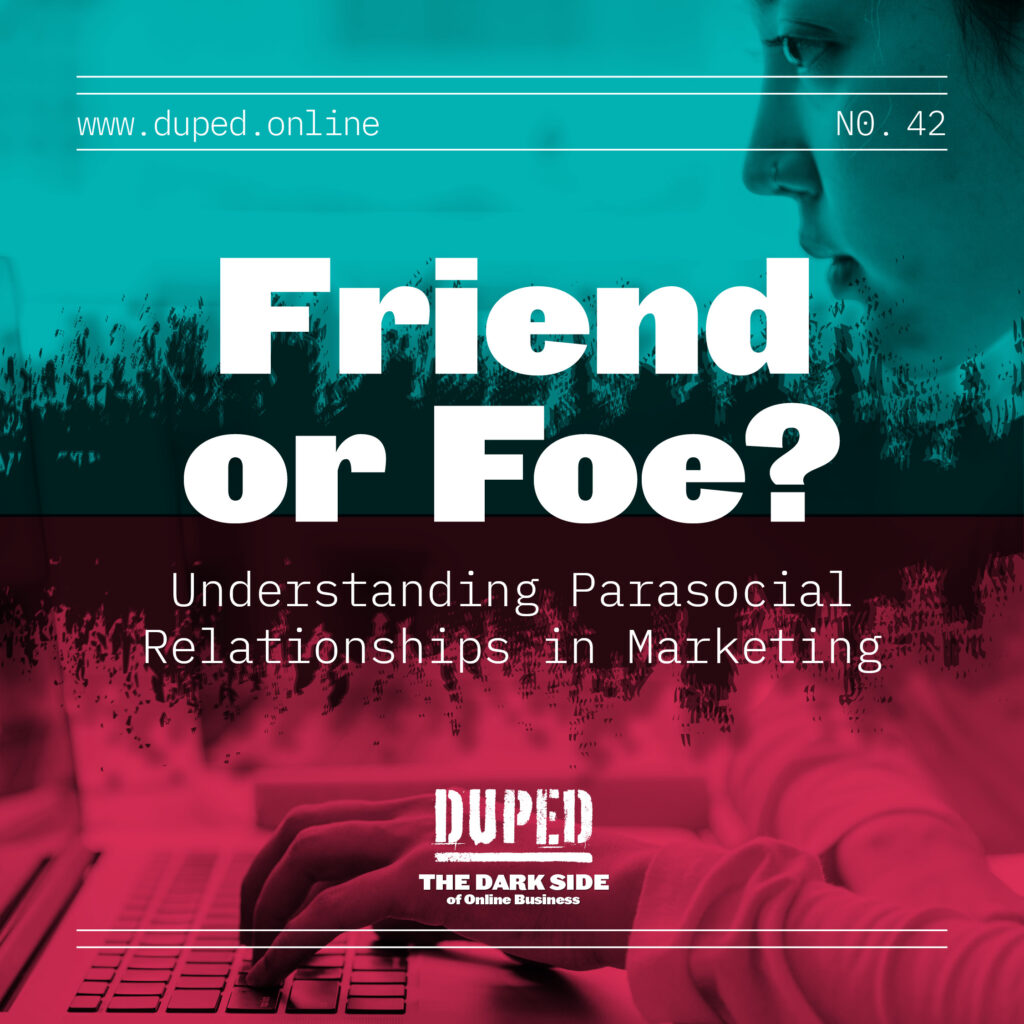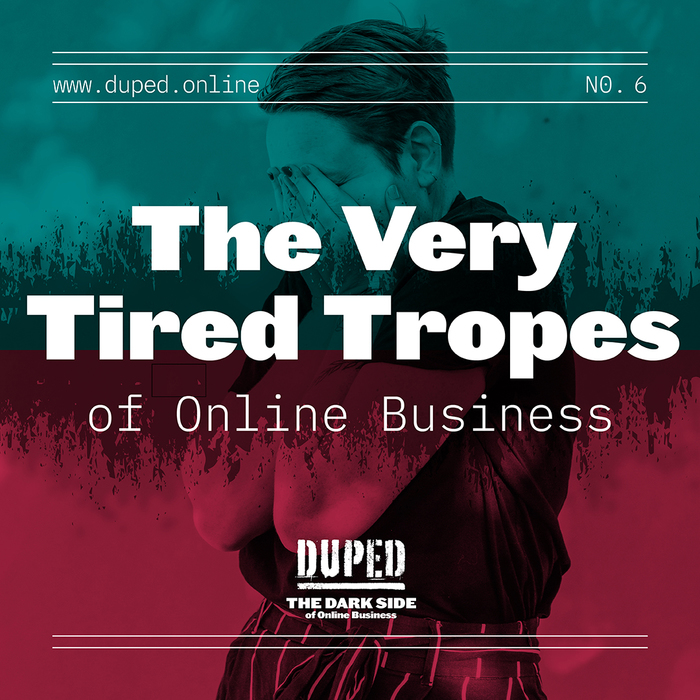
The Very Tired Tropes of Online Business

Have you ever noticed that many celebrity entrepreneurs are essentially promising the same thing through their coaching, courses and programs? Whether it’s a 7-figure lifestyle or the passive income dream, internet marketing tropes are running amok in the online world of business.
Here’s the deal: these cliches are making promises that most people will never realize and that’s messing with our heads and our very definition of success.
Which is why we are breaking down these tired tropes of online business on this episode of Duped.
What You’re Not Going Hear on Today’s Show…Or Any Other Time
Since we are talking about tired tropes today, certain businesses will pop into your mind. I know some of you have been wondering (because you’ve been in our DMs asking), if we’re going to name names on the pod and call people out.
And the answer is: NO!
We liken this podcast to being more like NPR than the UK Tabloid, The Daily Mail. Let’s face it, we all know who the big names are using these tricks and tropes. You don’t need to hear it from us.
The purpose of Duped is is to help you identify these tactics when it’s being done by other less Internet famous business owners. We want to help you become a savvier consumer and root out these practices in your own business.
With that out of the way, let’s dive into the tired tropes of internet marketing.
What’s a Trope?
Merriam Webster defines a trope as a common or overused theme or device. If you’ve ever seen a horror movie, you know exactly what that means. Young couple making out – oh those people are goners, the evil clown who murders people, and the inevitable jump scare that happens after you think the killer is dead.
For the most part, tropes become cliches that we end up making fun of. In online business, there are far too many tropes to list them all in a single show so today we’re focusing on: Influencer Tropes, Money Tropes and Sales Tropes.
Before we dive in, I wanted to talk briefly about why these Internet Marketing Tropes are harmful at a high level.
Most of us in the online business world got into business not because we wanted to be business people but because we had an expertise or passion. Something we loved doing and want to do more of.
Which means we most of us have limited knowledge of how to run a business, so how do we learn? According to psychologist Albert Bandura’s Social Learning Theory, we learn from watching and observing others.
We see celebrity entrepreneurs with their large followings and their 8-figures claims, and we think, “ if I emulate what they are doing, I’ll be successful like them”.
Let’s talk about the three big tropes we need in online business.
Influencer Tropes
Influencer Tropes sell a lifestyle. Yes, the actual product is a course or a program, but the way it’s marketed and sold is all about the lifestyle, my friend.
When we think of a person selling their lifestyle what comes to mind might be:
- Private Jet
- Luxury vacations
- Tesla/Lambo
- Trips to Bali
- Eiffel Tower photoshoots
- Expensive real estate purchases
- The “If I can do it, you can do it” message
In Gabrielle Bluestone’s book, Hype: How Scammers, Grifters, and Con Artists Are Taking Over the Internet – and Why We’re Following, Bluestone perfectly applies Bandura’s Social Learning theory. She writes “When we see influencers rack up thousands of likes and comment, we’re likely to follow suit…but when we don’t receive that same adulation ourselves, we tend to feel worse.”
Think about that for a moment, when the course or program you purchase doesn’t yield the same results and you don’t end up with the lifestyle the business influencer is promoting, you blame yourself!
It’s not your fault. The lifestyle is being sold with zero context. And in next week’s episode we’re diving way more into the luxury lifestyle.
Money Tropes
It’s time to talk about the biggest messaging trope out there. The 7-figure and now even the 8-figure business trope. Cue the eyerolls.
The money trope dominates online business. It almost feels like you can’t sell anything if it’s not tied directly to revenue.
Some examples of money tropes include:
- 7-figure/8-figure revenue claims
- Make money in your sleep
- Revenue reports
- Income testimonials with zero context
- 10X your business
- Scale your business
Here’s the problem with the buying into money tropes, and I wanted to give a shout to my friend Tara Newman at the Bold Leadership Revolution for turning me on to this study.
According to the 2018 State of Women Owned Business by American Express, 88% of women owned businesses earned less than $100,000 in revenue. When I looked up the 2019 study, the number hadn’t improved.
Even though this number is for women, I’d say the vast majority of celebrity entrepreneurs promote these money-making tropes too. They don’t have a business that could actually get to a 7-figure business in the time allotted for a course or program.
It’s all smoke and mirrors.
Sales Tropes
The final trope is sales – or what I’d call “making the sale at any cost”. In online business, we’re taught that there’s never a valid reason to say no. If people say no, it’s their mindset that is getting in the way.
Examples of the sales trope:
- Prices not listed on the sales page
- Shouting out people who joined your program to create FOMO
- The invest at all costs message
- The idea that money is never the real reason why some people say no
- If you were a “serious” owner you’d make this investment
- 12-month payment plans or programs that last weeks
- The “I was scared to invest too and here’s how amazing my business is now” story
Let’s go back to the statistic of 88% of women owned businesses making less than $100K. For these business owners to invest in a 5K or 10K program is a HUGE chunk of their business revenue.
This is particularly harmful because of something called Affective Misforecasting. Consumer Psychologists Bauer and Fitzpatrick defined this phenomenon as “the gap between predicted and experienced affect.” Really, we’re often wrong about how we feel about our purchases in the future.
When we first buy a program “OMG, this is going to be business changing. I’m so excited to dive in and do all the modules because this will be the thing that gets me to 10x my business.”
Then we’re in the program, and we think, “I’m so overwhelmed. There are so many modules. I don’t know what I should prioritize. I’m going to give up and look for another solution.”
Sales tropes play on the exciting, game changing potential of the program when in reality that program, course or coach rarely contains the answers.
Let’s Talk Solutions
How do you prevent yourself from falling prey to any of these tropes or if you’ve seen your own marketing message or branding in these tropes what should you do?
- Be a pattern spotter. These tropes are cliche and commonplace so if you see a business using them, that should raise a red flag.
- Do your research on the person’s expertise. Read their about page with a critical eye and ask yourself what makes them an actual expert?
- Don’t invest or get on sales calls without the facts. Avoid engaging with people who don’t tell you what the price is first or at least give you a starting range.
- Skip the mindset blame game. Watch out for the celebrity entrepreneur blaming you and your mindset.
- Ditch the tropes in your business. If you’ve noticed some of these tropes in your own business, realize that you don’t have to market like an influencer. It’s time to get creative with your messaging and your branding
Remember, because of social learning theory it is easy to think “well if that’s the way a seven-figure entrepreneur with all the trappings does it, then that’s what I should do.”
Remember, there’s more than one way to build a business.
Links for this episode:
Join the

Patreon

for only $7/month and get a
monthly bonus episode,
behind-the-scenes content
and more.


